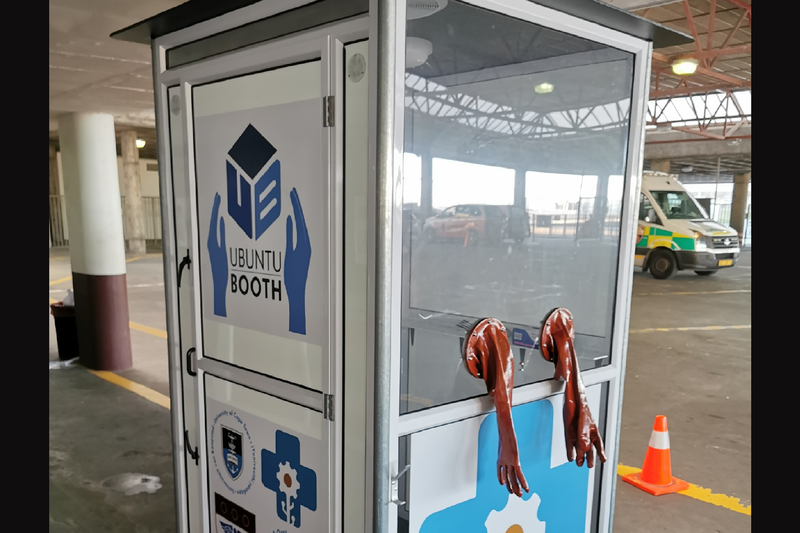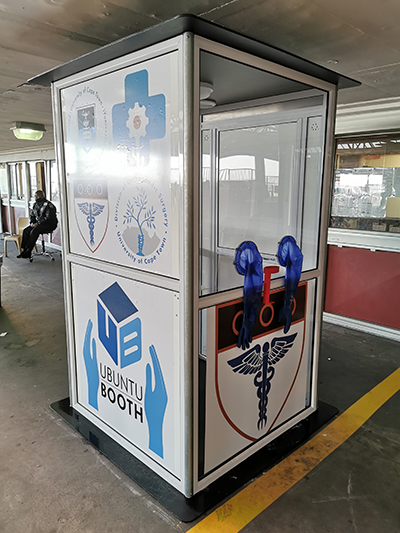Ubuntu Booth prioritises frontline healthcare workers
05 August 2020 | Story Niémah Davids. Photos Supplied. Read time 6 min.
“We believe that a person is a person through another person; that my humanity is caught up, bound up inextricably, with yours. When I dehumanise you, I inexorably dehumanise myself.” This is Archbishop Emeritus Desmond Tutu’s definition of ubuntu.
A team of academics at the University of Cape Town (UCT) agree. With the spirt of ubuntu in mind, they’ve put their heads together to develop a special COVID-19 testing station to safeguard healthcare workers at the coalface of the pandemic.
The Ubuntu Booth has been designed to specifically protect healthcare workers who swab patients for COVID-19, and its nifty design enables them to do so while ensuring there is no contact with the patient or risk of infection.
The novel testing booth was engineered and created by biomedical innovators Associate Professor Sudesh Sivarasu and Tertius de Villiers in the Medical Devices Lab in the Division of Biomedical Engineering in UCT’s Department of Human Biology. They worked in partnership with Professor Stephen Roche, Professor Michael Held and Robyn Waters in the Division of Orthopaedic Surgery at Groote Schuur Hospital.
According to Sivarasu, to obtain a COVID-19 sample from a patient, healthcare workers need to be “incredibly close” to the person to insert a swab into the nose or throat – a lot closer than social distancing guidelines require.
“Obtaining a sample often irritates the nose or throat, and occasionally the patient may cough or sneeze when the swab is removed. Coughing creates aerosolisation and these aerosols often place healthcare workers at incredible risk,” he said.
A rugged exterior
The Ubuntu Booth is made from readily available materials and boasts aluminium frames and Perspex windows. Its acrylic panels act as the “highly protective” barrier between the clinician and the patient.
“The booth allows for zero contact and minimises the chances of infection from droplets or aerosol.”
The lightweight, freestanding booths are also designed to withstand adverse weather conditions and are “perfect” for pop-up COVID-19 testing stations. The booths are also a natural fit for outdoor drive-through tests.
“Ubuntu Booths are so versatile.”
Complete protection
With personal protective equipment (PPE) constraints around the country, Sivarasu said the team agreed that it was time to innovate.

“An enormous amount of PPE is used when swabbing [for COVID-19] outside a testing booth. We needed to think of something different,” he said.
After pulling on their collective thinking caps and grabbing some inspiration from Israel, India and Taiwan, the team developed the country’s first Ubuntu Booth.
The booth allows healthcare workers to step inside from multiple entry points and ensures that they are “completely protected” when they swab patients for COVID-19 using a set of built-in gloves.
“The booth allows for zero contact and minimises the chances of infection from droplets or aerosol. Our healthcare workers are some of the most important resources we have to combat this pandemic and we need to protect them,” De Villiers said.
PPE is unsustainable
To avoid cross-contamination, Sivarasu said healthcare workers are ideally required to wear a new set of PPE with every new COVID-19 test. After every test, they are required to remove their PPE, discard it and get a new set before testing the next patient.
“This adds to the amount of time between tests and to the large amount of plastic waste, which is very bad for our environment. With the Ubuntu Booth there’s minimal to zero waste,” he added.
The booth also has the potential to save healthcare facilities thousands of rands, which would otherwise have been used on PPE. Sivarasu noted that healthcare facilities spend in excess of R100 per healthcare worker for a single set of PPE. This includes clothing, a mask, gloves, an apron and a face shield. Some facilities process up to 200 COVID-19 tests per day.
“There’s a huge saving with Ubuntu Booth because only the outside of the booth needs to be cleaned.”
“There’s a huge saving with Ubuntu Booth because only the outside of the booth needs to be cleaned, using any generic medical-grade cleaner, which is generally inexpensive and often available in abundance at the testing sites. This lifts great financial pressure off the health sector at large,” he said.
A welcome addition
Currently, Groote Schuur Hospital’s COVID-19 testing centre makes use of one testing booth, and Sivarasu said healthcare workers have taken to it like fish to water.
“The positive comments confirm what we set out to do: healthcare workers now feel so much safer swabbing from the booth. That’s what we want to hear,” he said.
Khayelitsha Community Health Centre also expressed interest in three testing booths, and Sivarasu said his team are in conversation with officials at the facility to design booths tailored towards the centre’s individual needs.
Looking beyond COVID-19, Sivarasu said the Ubuntu Booth can also double up as a testing station for other infectious diseases like tuberculosis.
“This is one of its added benefits and demonstrates its versatility, which is what really makes Ubuntu Booth so unique.”
 This work is licensed under a Creative Commons Attribution-NoDerivatives 4.0 International License.
This work is licensed under a Creative Commons Attribution-NoDerivatives 4.0 International License.
Please view the republishing articles page for more information.
UCT’s response to COVID-19
COVID-19 is a global pandemic that caused President Cyril Ramaphosa to declare a national disaster in South Africa on 15 March 2020 and to implement a national lockdown from 26 March 2020. UCT is taking the threat of infection in our university community extremely seriously, and this page will be updated with the latest COVID-19 information. Please note that the information on this page is subject to change depending on current lockdown regulations.
Minister of Health, Dr Joe Phaahla, has in June 2022 repealed some of South Africa’s remaining COVID-19 regulations: namely, sections 16A, 16B and 16C of the Regulations Relating to the Surveillance and the Control of Notifiable Medical Conditions under the National Health Act. We are now no longer required to wear masks or limit gatherings. Venue restrictions and checks for travellers coming into South Africa have now also been removed.
Read the latest document available on the UCT policies web page.
Campus communications
2022
UCT Community of Hope Vaccination Centre
On Wednesday, 20 July, staff from the University of Cape Town’s (UCT) Faculty of Health Sciences came together with representatives from the Western Cape Government at the UCT Community of Hope Vaccination Centre at Forest Hill Residence to acknowledge the centre’s significance in the fight against COVID-19 and to thank its staff for their contributions. The centre opened on 1 September 2021 with the aim of providing quality vaccination services to UCT staff, students and the nearby communities, as well as to create an opportunity for medical students from the Faculty of Health Sciences to gain practical public health skills. The vaccination centre ceased operations on Friday, 29 July 2022.
With the closure of the UCT Community of Hope Vaccination Centre, if you still require access to a COVID-19 vaccination site please visit the CovidComms SA website to find an alternative.
“After almost a year of operation, the University of Cape Town’s (UCT) Community of Hope Vaccination Centre, located at the Forest Hill residence complex in Mowbray, will close on Friday, 29 July 2022. I am extremely grateful and proud of all staff, students and everyone involved in this important project.”
– Vice-Chancellor Prof Mamokgethi PhakengWith the closure of the UCT Community of Hope Vaccination Centre, if you still require access to a COVID-19 vaccination site please visit the CovidComms SA website to find an alternative.
Frequently asked questions
Global Citizen Asks: Are COVID-19 Vaccines Safe & Effective?
UCT’s Institute of Infectious Disease and Molecular Medicine (IDM) collaborated with Global Citizen, speaking to trusted experts to dispel vaccine misinformation.
If you have further questions about the COVID-19 vaccine check out the FAQ produced by the Desmond Tutu Health Foundation (DTHF). The DTHF has developed a dedicated chat function where you can ask your vaccine-related questions on the bottom right hand corner of the website.
IDM YouTube channel | IDM website
“As a contact university, we look forward to readjusting our undergraduate and postgraduate programmes in 2023 as the COVID-19 regulations have been repealed.”
– Prof Harsha Kathard, Acting Deputy Vice-Chancellor: Teaching and Learning
We are continuing to monitor the situation and we will be updating the UCT community regularly – as and when there are further updates. If you are concerned or need more information, students can contact the Student Wellness Service on 021 650 5620 or 021 650 1271 (after hours), while staff can contact 021 650 5685.




















